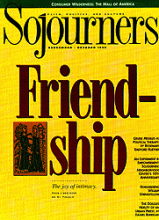Home. It is, in its rightful incarnation, the place where you are declared safe. Home has familiar smells, familiar faces, familiar stuff, familiar food, familiar nuisances. If you have a home, more likely than not most of the time you take it for granted. If you've lost it, you mourn it like family.
The Bible is filled with wanderers in search of home. We join our journeys with theirs, not to find shortcuts, but to better understand what we seek. The Spirit leads us through wildernesses we wouldn't choose for ourselves. The promise is home.
September 5: The Authority of Love
Exodus 19:16-24, Romans 13:1-10, Matthew 18:15-20, Psalm 115:1-11
Context is everything. Taken alone, Romans 13:1 ("Let every person be subject to the governing authorities. For there is no authority except from God...") seems not just to uphold law and order, but to disallow argument with the government--whether it is passing legislation or passing ammunition.
In Romans 12, Paul addresses aspects of how a Christian should act. Verse 12:2 instructs, "Do not be conformed to this world, but be transformed by the renewal of your mind." It concludes with verse 12:21, on the love of enemies: "Do not be overcome by evil, but overcome evil with good."
Christians living by these tenets would be expected to avoid wrongdoing that would necessitate civil punishment. Obviously, much of what is punishable under civil authority--murder, theft, assault, etc.--goes against the ethical traditions of scripture and the call to "live in harmony with one another" (Romans 12:26).
Read the Full Article

